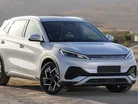Chinese EV Makers Gain Ground in Europe

Chinese electric vehicle (EV) manufacturers like Xpeng, BYD, Hongqi, and Great Wall Motors (GWM) are making significant inroads into the European market. As the world's two largest EV markets, China and Europe have a dynamic relationship in the automotive sector. Historically, European carmakers have been exporting vehicles to China and establishing production sites and joint ventures there. However, the trend is now reversing with Chinese brands entering Europe.
Rising popularity and market penetration
Consulting firm Inovev noted that approximately 75,000 new cars from Chinese manufacturers were registered in Europe in the first half of 2022, with expectations for another 150,000 units by the end of the year. This surge includes brands like Nio, which has expanded into the influential German market after a successful launch in Norway. Additionally, cars from Chinese brands SAIC Motors and Geely, such as the MG and Polestar, have climbed into Europe's top 20 best-selling EVs.
Innovation and experimentation
Chinese manufacturers have been leaders in EV development, leveraging their experience with clean car technology. Since the 2010s, companies like BYD and Geely have been exploring advancements with electric buses and motorbikes, respectively. BYD began using electric buses to enter the North American market as early as 2009, supplying fleet vehicles to the Los Angeles Metro System by 2013. These buses are now also present in South America. On the other hand, Geely has focused on motorbikes, requiring lighter and more portable batteries than cars, thereby enhancing battery technology.
Government support and collaboration
Government support and industry collaboration within China are bolstering the progress of Chinese EV manufacturers. In 2009, the Chinese Government offered subsidies for purchasing full EVs, hybrid vehicles, and buses in major cities like Beijing and Xi'an. This support has significantly contributed to the popularity of EVs in China, with Bloomberg New Energy Finance (BNEF) estimating that plug-in cars will make up to 40% of sales in 2024.
Advanced technology and connectivity
A significant driver of the popularity of Chinese EVs is their focus on connectivity and advanced technology. For instance, Hongqi's advanced charging systems and autonomous parking features streamline the driving process, while Nio's battery-swapping services enable customers to replace and lease EV batteries easily. These functionalities appeal to a tech-savvy, young, and flexible market.
Competitive edge in Europe
Chinese manufacturers are making significant strides in the European automotive market by offering digitally agile, competitively priced alternatives. Their success underscores the demand for EV innovation and advancement at a reasonable cost, demonstrating a promising future for European Chinese EV brands.
*******************
Make sure you check out the latest edition of EV Magazine and also sign up to our global conference series - Sustainability LIVE 2024.
*******************


